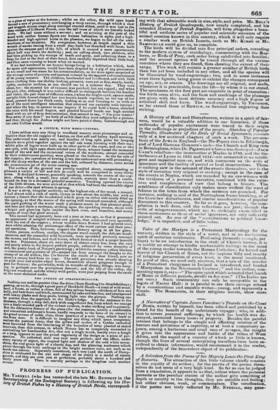A History of Riots and Disturbances, written in a spirit
of fair- ness, would be a valuable addition to our literature, if' those outbreaks of popular excitement were traced to their origin in the sufferings or prejudices of the people. Sketches rf Popular Tumults, illustrative of the Evils of Social Ignorance, consists only of a few scattered chapters of such a work. The persecu- tions of the Jews in England—the No-Popery riots in Edinburgh, and of Lord GEORGE GORDON'S mob—the Church and King riots in Birmingham, w hen Dr. Pf1RSTLEY'S house was destroy ed —J ACK CADE'S rebellion—the insurrection at Naples in 1799. and the dis- turbances at Lyons in 1831 and 1834—are recounted in an intelli- gent and impartial man,■er, and with comments on the evils of ignorance and the futility of partial or local insurrections. There is nothing new in the account of the events themselves, nor is the style of narration very original or striking ; except in the case of the events at Naples, which are recorded by an eye-witness with the vividness of a personal narrative, combined with the calm- ness and completeness of view ihat belong to history. The semblance of classification only makes more evident the want of fulness in the texts from which the sermons are preached. For instance, nothing is said of the Nottingham fraine-breakilig. or of the Corn-law disturbances, and similar manifestations of popular discontent in this country. So far as it goes, however, the com- pilation is well done, and the reflections are just; though the evils of misgovernment, which are as strikingly cxem.,Iiliell in these occurences as tlr,se of social ignorance, are only indirectly pointed out. As one of the " contributions to political know- ledge,- it is imperfect, and of little value.


























 Previous page
Previous page